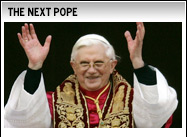
BLESSING: The newly-elected Pope Benedict XVI greets the flock from the balcony of St. Peter's Basilica
David Van Biema: The choice reflects a number of things: A desire for continuity with the papacy of John Paul II, which the cardinals believe — correctly or incorrectly — that Ratzinger best represents, having been more intimately involved with the last papacy than anybody expect John Paul II himself. As the head of the Congregation for the Doctrine of the Faith, he was John Paul II's theological enforcer for almost a quarter century. A second consideration would probably be that Ratzinger was almost universally acknowledged as one of only a handful of cardinals possessing the gravitas to take on the papacy. His intellect, his piety, his grasp of what the Church is all about and his willingness to grapple with the issues that face it were probably as great, if not greater than anyone else in that room. It takes a certain sort of person, in the eyes of the cardinals, to combine the qualities needed to make a good pope. And Cardinal Ratzinger represented one of a few who they already knew, without extensive investigation, possessed those qualities, and was able conceptually, intellectually and spiritually to take on the job.
 |
||||
|
POPE BENEDICT XVI |
||||
| Web Exclusive | ||||
| Daily reports from the scene in Vatican City |
||||
| Learn more about the Papacy in the TIME Archive |
||||
TIME.com: Could it be said that choosing a figure from within the Curia, known primarily as a strict and vigorous enforcer of doctrinal positions, may reflect a greater concern with managing the Church's bureaucracy and doctrinal issues among the clergy than with the sort of pastoral role played among the Catholic faithful by John Paul II?
DVB: By virtue of his central and high profile role in the previous papacy, we certainly know more about Benedict XVI than about many of the people who might have gotten the job. If there is a question mark over what he may do in the course of his own papacy, it probably has to do with the question if he'll act in a different way as pope than as head of the Congregation for the Doctrine of the Faith, which used to be called the Office of the Inquisition. It is not pastoral by nature. It deals with possible heresies, which requires an approach very different from that of a pastor dealing with his flock. There were two sides to John Paul II: his doctrinally conservative side, and his pastorally brilliant side. That enabled him to communicate effectively with his flock and garner a certain sympathy even when announcing a teaching that some of them disagreed with. It was one of his great gifts to be able to maintain a connection even with many of the people of his Church who disagreed with him. And that pastoral brilliance softened his conservative legacy within the Church. So the question becomes, is Benedict XVI capable of developing a pastoral side that could similarly soften the impact of his doctrinal side, which has been prominent for so long?
Managing the Curia, the Church's bureaucracy, is a separate question, and it may be as open-ended as the one about how good a pastor Benedict will be. It's less important to the non-Catholic on the street, but it's extremely important to the Church. Ratzinger was a master of the Curia, and used it as well as anybody. At the same time, he's reportedly of a non-bureaucratic cast of mind, and prefers to be as direct as possible in getting things done. That may prompt him to streamline the Curia. There's certainly some anticipation that he'll shake things up.
A related question is how centralized the Church will become, and whether any authority will devolve back to the Bishops. Benedict's papacy will pour cold water on the hopes of those who saw Vatican II as opening up the Church on questions of distribution of authority and autonomy, either to the residential bishops or to the laity. Most of the great debates of the past half-century in the Catholic Church have been about how to interpret Vatican II. Many Catholics in the U.S. who have problems with the Church's stance on all kinds of issues, such as birth control, abortion, the status of gay people and other issues had already been greatly discouraged under John Paul II from expecting a shift towards emphasizing the primacy of individual conscience. The choice of Ratzinger won't please those believers in the U.S. who had been hoping that a new papacy might, if not advance a more liberal interpretation of Vatican II then at least reopen discussion over it, which had been shut down under John Paul II with Ratzinger as enforcer.
TIME.com: Benedict XVI's frequently stated positions appear to accept the inevitability of the decline of Church membership in the industrialized West, rather than to reach out to accommodate the concerns of those who might be drifting away from the Church.
